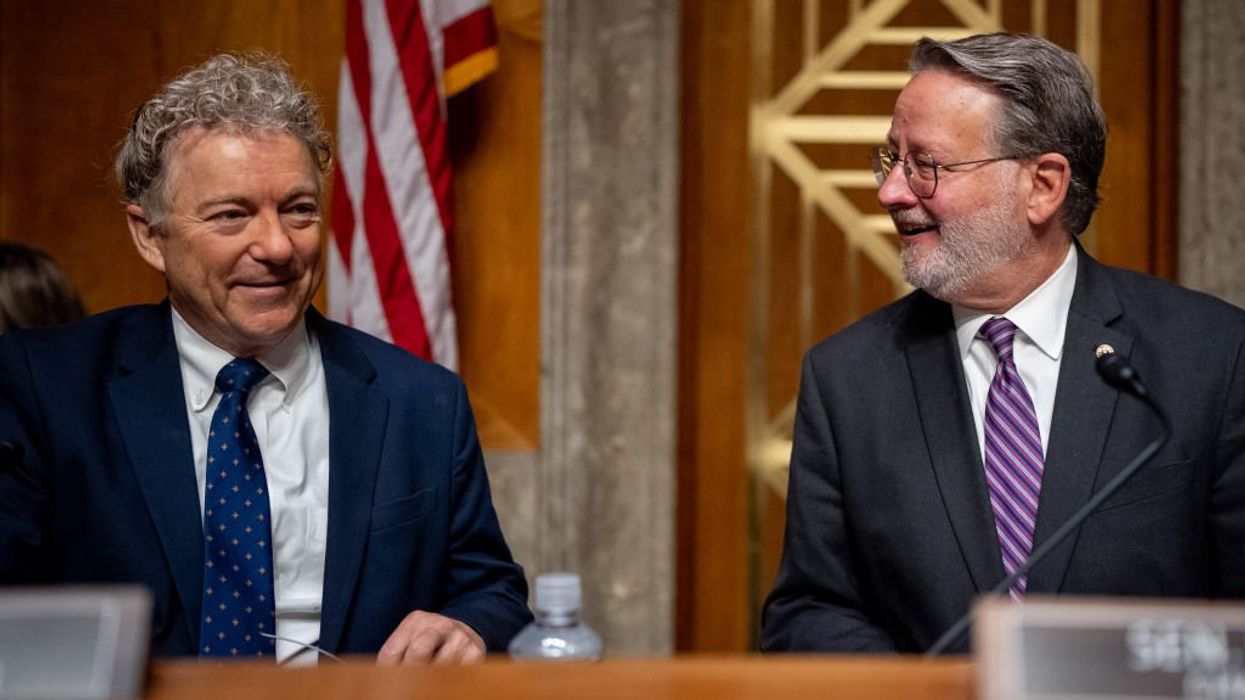
Photo by Andrew Harnik/Getty Images

A rare moment of agreement in Washington?
In a suprisingly substantive hearing today, members of the Senate Homeland Security and Governmental Affairs Committee appeared to demonstrate an emerging consensus that gain-of-function research, which some believe was likely responsible for the COVID-19 pandemic, requires significant additional governmental oversight or perhaps elimination altogether.
The hearing, which was chaired by Democratic Sen. Gary Peters (Mich.), was convened to continue the Senate's continuing investigation into the origins of the COVID-19 pandemic. Some of the Senators did focus to some degree on the well-trod ground of natural origin vs. lab leak theories, but the larger portion of the debate centered around the need for reform and additional oversight of gain-of-function research by the United States government.
The hearing featured four witnesses who have been involved in varying degrees in the debate over the most likely origin of the COVID-19 pandemic, including Dr. Gregory Koblentz of George Mason University, former Stanford professor Steven C. Quay, Rutgers University Professor Dr. Richard Ebright, and Tulane Professor Dr. Robert Garry, who co-authored the highly controversial "The proximal origin of SARS-Cov-2" paper which was widely used to discredit proponents of the lab leak theory.
"The fact that this hearing even happened is a big step from the lockstep denials of any government culpability in creating the pandemic that have typically come from Democrats."
Sparks flew a few times during the course of the hearing, particularly during questioning of Dr. Garry, who was accused of scientific fraud by co-panelist Dr. Richard Ebright. Garry, for his part, continued to place himself among the apparently shrinking universe of scientists who believe that the most likely source for the pandemic was the Huanan Seafood Market in Wuhan. He stood by his work on the "Proximal Origins" paper, claiming, "It's been one of the most scrutinized papers in history. It's held up very well."
When confronted with emails between himself and other co-authors of the paper that seemed to suggest that all the paper's authors had at one point some degree of belief in the lab leak theory, Garry contended that the about-faces executed by himself and co-author Kristian G. Andersen were the result of adhering to "the scientific method," and not, as many have claimed, the result of a pressure campaign orchestrated by Dr. Anthony Fauci, Dr. Francis Collins, Jeremy Farrar, and others. In response to angry questioning from some Republican members of the committee about censorship efforts that were undertaken by the government in response to the paper, Garry retreated to the defense, "All we did was write a paper," and insisted that "We didn't put anything in the paper we didn't believe."
Most Senators, however, seemed to unite around an emerging bipartisan consensus that gain-of-function research needs to subjected to additional government oversight. Even Democrats on the committee, led by Peters and New Hampshire Sen. Maggie Hassan, asked both Garry and Koblentz a series of pointed questions that seemed to preview their belief that not only does government funding of research need to be reined in, but also that private research should be subjected to government regulation.
For example, at one point, Hassan pressed Koblentz on the current total lack of oversight on labs that might be conducting risky research. "Private companies, universities, and research institutions are also engaged in cutting-edge research. While their research has the potential to cure diseases and boost our economy, unless they accept federal dollars, there is very little federal oversight to ensure that private labs are engaged in safe and ethical research." Hassan also expressed concern about "researchers performing off the books experiments that may be risky or unethical ... are the United States and international authorities sufficiently equipped to mitigate these risks?"
Peters, who went out of his way to praise ranking committee member Rand Paul in his closing remarks, also declared that he and Dr. Paul were in unison that Congress should take further action to prevent future pandemics and asked the panelists for recommendations for what the government should do about this risky research.
The Senate hearings presented a stark contrast to the recent House hearings on the same subject matter, thanks likely to the absence of the polarizing Dr. Anthony Fauci. Without Fauci sucking the oxygen out of the room, Senators from both sides of the aisle appeared willing to thoughtfully tackle the problem of risky research that, as Dr. Ebright said, literally threatens the future of mankind.
Their work comes not a moment too soon. As acknowledged by virtually all participants in the hearing, the current system of federal oversight is failing spectacularly, as evidenced by several recent high-profile incidents.
Matt Kibbe, president of Free the People and producer of the new investigative series "The Coverup," available exclusively on BlazeTV, was present at the hearing, and said, "The fact that this hearing even happened is a big step from the lockstep denials of any government culpability in creating the pandemic that have typically come from Democrats. Hopefully, all of Rand Paul's work will get to the truth, and full accountability."
Like Blaze News? Bypass the censors, sign up for our newsletters, and get stories like this direct to your inbox. Sign up here!
Leon Wolf
Former Managing Editor, News